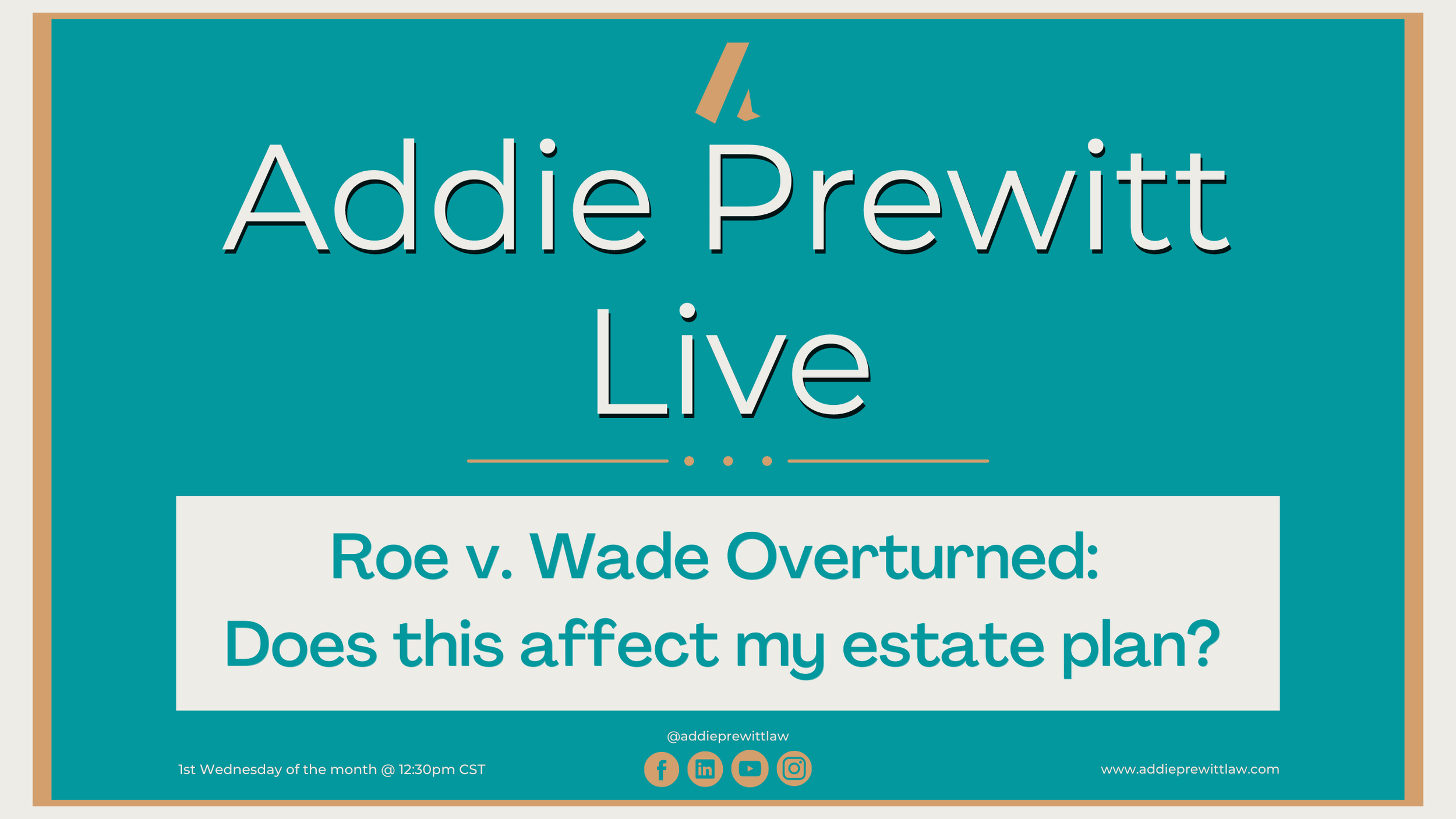Addie Prewitt Live: How Overturning Roe v. Wade affects your Estate Plan
Check out all episodes of Addie Prewitt Live here or on YouTube. Be sure to like, follow, and subscribe!
Episode 12 - How overturning Roe v. Wade affects your Estate Plan
July 6, 2022 @ 12:30pm CST
Hey everyone! Thanks for showing up to Addie Prewitt live today. I'm Addie Prewitt and a New Orleans-based estate planning lawyer, a mother of two small boys, co-owner of two independent pharmacies with my husband and have my own law practice. That's a little bit about me.
Today I wanted to talk to you about something that's been in the news lately that can be a bit of a controversial topic. I'm sure lots of people have lots of opinions about it, but there are some ways that it can affect your estate plan. And, I thought you should know what those are.
What exactly happened to Roe v. Wade?
What I'm talking about is that at the end of June, the Supreme court, in a case called Dobbs, explicitly overruled Roe v. Wade. The case that was brought before the court was whether or not Mississippi could implement a 15-week ban on abortion. So no abortions could be performed after 15 weeks.There were six justices who voted to uphold the law. Five of them, however, voted to explicitly overturn Roe v Wade.
And so thinking about this and reading what people were saying about Roe v Wade, it struck me that people have a misconception about what Roe v Wade said. I kept reading everywhere that it converted a constitutional right to abortion. And I think that is a very limited ruling. I think the actual Roe v Wade decision was much more limited than that. And so I thought I would give you some information on what it actually said, just so you would know you would have that information for yourself.
The way the court approached Roe v Wade is that it was brought to the Supreme Court. It was a Texas statute that criminalized abortion. And what the court said was that there is a balancing test that can be conferred. So there's a right to privacy for the woman, for her constitutional rights. One of which includes the right to make the choice to have an abortion, but there's also state interest in protecting the unborn fetus. And so the Supreme court in Roe came up with a framework, basically based on viability and trimesters, which said that anything in the first trimester a woman constitutionally had a protected right to choose. And the second trimester the state could have limited restrictions if they were based on maternal health and in the third trimester, the state could even restrict or ban abortion as long as there was an explicit allowance for maternal health. And so that's actually what Roe v Wade said. It was a balancing task.
And, that leads us into Louisiana. Louisiana itself has a trigger law. As soon as Roe V.
Wade was overturned, this law went into effect. It's currently not in effect because a temporary restriction TRO was issued last week by a judge. And so, there's a hearing on July 8th to decide whether the law will go into effect. I think this law brings into one of the first points I wanted to make about how this could affect your estate plan.
It’s never been more important to secure your future with a customized estate plan.
Overturning Roe v. Wade and in vitro fertilization
And that is in vitro fertilization and whether or not that would be constituted permissible in Louisiana under Louisiana's trigger law. Well Louisiana law does not explicitly say that in vitro is allowed. There are certain states like Alabama, whose law explicitly says that. The trigger law in Louisiana does say that this ban on abortion is not meant to extend to contraception. But the language is a bit, let's say, unclear to say the least.
That's just part of the reason the judge granted the TRO in the first place. And, there is some ambiguity and uncertainty as to what will go on. I think some of the things that, you know, when considering in vitro fertilization, or some things that you should consider, if you were freezing your eggs:
What happens to those frozen eggs if they are already fertilized?
Can they be destroyed and will this law prevent that?
Where should you hold those eggs?
If you are doing that, maybe it might be at a state outside of any state with these trigger laws.
And also, just generally, I would love to see the law to explicitly say in vitro fertilization is allowed. We know that many women and families are waiting till later in life to have pregnancies and use in vitro fertilization to grow their family. So I think it would be a great thing to have that in there.
The trigger law in Louisiana does allow for the mother's health to be a consideration that can be taken into account. However, just something for your own information, it does not include any exceptions for rape or incest. So that is something that is not in the Louisiana trigger law.
How some big companies are able to work around Roe v. Wade ruling.
The next thing that can come up that's been in the news lately is a lot of the big companies you see who are based in Texas are saying that they will pay for employees to travel if they need to access medical care. So what about if you're a small business in Louisiana? I think the way to think about this is as big companies that are putting those plans together are generally self-insured. They may have Blue Cross Blue Shield or Unite or whoever administering the plan, but they're basically taking on the risk for themselves. It's not the insurer that's taking on the risk. I would venture to say that most small businesses in Louisiana who do offer insurance are not self-insured. I mean, maybe there are some that are, but the ones I work with generally are not. And so the plan itself is the one who is insuring those risks. I think it would be hard to provide those benefits as a small business in Louisiana under the medical insurance plan. You probably need to do some additional planning if that's something that you were interested in doing.
Subscribe to receive updated content just like this delivered right to your inbox every week!
Roe v. Wade and same sex marriage.
And then a third thing I think that comes into play when we're talking about the overturn of Roe v Wade is from a constitutional lineage, so to speak, that found a right to privacy. Most people say this case, Griswold V, Connecticut, found a penumbra of rights based on the 13th, 14th, and 5th amendment jurisprudence, and it's called substantive due process.
Once that kind of constitutional right was found in Griswold, a constitutionally protected right to use contraception. It’s come down through the courts and the substantive due process clause has been used to afford greater rights. Some of the more common ones are ones that people typically think of or Loving v Virginia, which is the right to interracial marriage. Bowers's right to intimate same-sex relations. Obergefell v. Hodges, which is the right to same-sex marriage. I'm sorry I said Bowers, but that was not the case. That was actually a case from Texas that overturned that. But you kind of get the idea that this right to privacy has been found in cases, in addition to abortion.
And so one of the things that the majority opinion in Roe explicitly said was: abortion is different. We're not going after any of those rights. But it's sort of interesting because while they said that, one of the reasons they were allowed to overturn their decision, the stereo decision, the ability to not just overturn jurisprudence at will was found because the right to abortion was not a, I think they use the language, “historic” or “long-established” right. Or something like that. And I think some of those other cases, particularly Obergefell, found the right to same-sex marriage, is not a “long” right. It was President Obama's administration when that was found to be a right that existed.
So, I think that same-sex couples who are relying on marriage to confer property rights. Once you are married in Louisiana, the laws of intestacy apply. So whether or not you have a will, the state will say this is how your property goes. So, I think it's up for interpretation, whether or not some of those other rights might fall. There might be, even though you wouldn't have the rights as a married couple, you could have wills, you could have trust, you could have healthcare and power of attorney that gave your same-sex partner the right to make medical decisions on your behalf.
And so, while the majority was very clear that they were not going after that, I think there was one concurrence by Justice Thomas, who explicitly said he does not believe substantive due process exists. He thinks all those cases should be overturned. And so, I think it's easy for people to say, this is just a very specific instance, but, it's hard to imagine that there may not be some other rights that fall under the same line of reasoning.
So those are sort of my comments on the Dobbs decision and how it could affect your estate planning.
If you have any questions, I'd be happy to answer them! Be sure to like, follow, and subscribe on your favorite platform, so you never miss an episode. And as always, you can hit me up at addieprewittlaw.com, if you want to learn more information about me and my practice I hope you have a great day!


